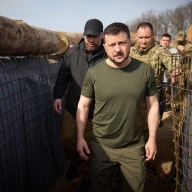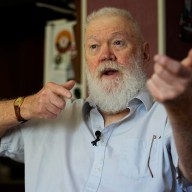KABUL, Afghanistan – Mubaruz Khan didn’t bother to vote in Afghanistan’s second-ever democratic election last month. He was too busy eking out a living selling cigarettes and soda for $3 a day, and didn’t think voting would make a difference in his life.
Millions like Khan stayed home on Aug. 20, a sharp contrast to 2004, when Afghans jammed polling stations to give President Hamid Karzai his first term. Ominous warnings from the Taliban suppressed turnout, but some Afghans said they were also discouraged by the government’s failure to halt endemic corruption, spiraling unemployment and crumbling security.
“We want peace. We want security. We want job opportunities,” the 55-year-old Khan said Monday. “Otherwise, the democracy and the elections that they are all shouting about every day mean nothing to us.”
Nearly a month after Afghanistan voted, the election’s messy aftermath has exposed the difficulties of installing a Western-style democracy in a land that has never seen one – and raised questions about whether an electoral system can take root eight years after the U.S.-led invasion that ended the Taliban’s radical Islamist rule.
The country’s election commission originally hoped to declare a certified winner this week, but claims of ballot-stuffing and phantom voters have pushed that timeline back weeks, if not months, leaving the country in political limbo at a time when the Taliban is unleashing a record number of attacks. Thousands of fake ballots were submitted across the country, and many returns showed Karzai winning 100 per cent of the vote in some districts.
The latest partial count has Karzai leading with 54 per cent to leading challenger Abdullah Abdullah’s 28 per cent, and a full count was expected later this week. If enough votes are eliminated for fraud complaints, Karzai’s tally could fall below the 50 per cent threshold, forcing a two-man runoff.
In a country dominated by tribal and ethnic loyalties – and scarred by years of civil war and Taliban rule – it’s not yet clear if democracy will take hold.
“We can’t say that democracy has worked in Afghanistan. Democracy has failed in our country,” said Abdul Khaliq, 48, a shopkeeper who voted for Karzai in 2004 but this year cast his ballot for Abdullah. He’s one of the few people he knows who voted at all. Last election, there were hundreds of people waiting in line at his polling station; this year, there were 10.
President Barack Obama has made Afghanistan the Pentagon’s No. 1 priority after the Bush administration for years poured most of its resources into Iraq.
But as the U.S. considers sending thousands more troops into the country to counter rising Taliban violence, American political leaders are wondering whether creating Western-style democracy should be among their goals.
“I do not believe we can build a democratic state in Afghanistan,” Sen. Diane Feinstein, a Democrat from California, told CNN on Sunday. She said American troops in the country should focus on preventing the Taliban from returning to power.
Some Afghans have expressed fear that competing political parties could further destabilize a country already wracked by near-daily bombings, rocket attacks and other Taliban assaults, according to Anna Larson, a British researcher and author of a six-month study for the Afghanistan Research and Evaluation Unit, an independent think-tank in Kabul.
Many of the dozens of Afghans interviewed had expected democracy to automatically bring peace, prosperity and clean government – and expressed bitterness that it has not.
“There is widespread disappointment with the benefits democracy can bring,” Larson said.
Even so, most still favour a system of one-person, one-vote to choose leaders, but they picture a vaguely defined system of “Islamic democracy” that combines elections with Afghan culture.
Wadir Safi, a political science professor at Kabul University, said Afghans are swiftly losing faith in democracy because Karzai’s much-heralded elected government has been so ineffective.
It’s not yet possible to calculate the exact election turnout, but it appears to be low. Preliminary numbers indicate turnout will be around 35 per cent of the 17 million registered voters, down by half from the 70 per cent who voted in 2004.
The spokesman for Karzai’s campaign, Waheed Omar, rejected the idea that Afghans might be losing faith in democracy.
“People showed their support for democracy by participating in the election, although in smaller numbers, even in the face of great threats and obstacles,” Omar said.
















